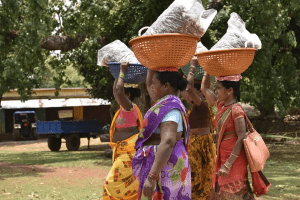Bastar, a district in the state of Chhattisgarh, is home to one of the largest tribal populations in the country. According to the 1991 census, at least 72 per cent of the population belonged to the Scheduled Tribe social group. According to the 2011 census data, at least 86 per cent of the population of Bastar live in rural regions and the female literacy rate in the rural region pegs at only 38 per cent (Census India, 2011). While agriculture remains the dominant occupation in the region, trading of forest produce also constitutes a bulk of livelihood options in the region (Ganguly & Chaudhary, 2003).
In the context of Bastar, there is a need to enhance traditional supply chains by infusing new technologies, creating sustainable working models similar to FPOs, and training rural enterprises to adapt to changing market needs. To this end, LEAD at Krea University parntered with The Tribal Hermit to test a livelihoods model for supporting Tribal enterprises to enhance their income through the digitisation of their supply chain. The intervention was designed as an upskilling program for a cluster of tribal women who were organised into a collective by the implementation partner.
This evaluation aimed to undertake a quantitative assessment with qualitative insights to understand opportunities for promoting sustainable livelihoods among SHG members belonging to tribal groups, and how existing market-based approaches can be adapted to support these objectives:
• Evaluating the impact of digitising the supply chain of the livelihood program on the social and economic empowerment of the tribal women in the FPO.
• Understanding the impact of the program on time use between paid FPO activities and unpaid household activities, expenditure and savings behaviours, financial risktaking, and other aspects of tribal women’s entrepreneurial activities.





